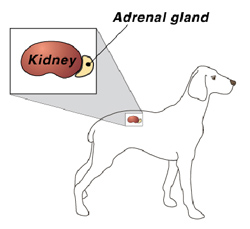
Endocrinology refers to the study of the endocrine glands in the body, their hormones produced, and their related diseases.
It is important to identify endocrine problems in dogs and cats as early as possible. These conditions are serious and potentially life-threatening but are manageable if caught early and treatment is started.
The endocrine system is the collection of the glands that produce hormones that regulate metabolism, growth and development, and reproduction and are dispersed to different areas of the body, depending on the hormone’s function. When a hormonal balance is disturbed, by a tumor or autoimmune disease for example, an endocrine disorder can develop. “Hyper” refers to an excess of hormones, and “hypo” refers to a deficiency in a hormone. Treatment will vary depending on the disease.
Several of the common endocrine disorders found in dogs and cats are:
- Diabetes mellitus- is caused by a deficiency of the pancreatic hormone insulin, which results in a failure to metabolize sugars and starch. Can develop in both dogs and cats.
- Hypothyroidism- occurs when not enough thyroid hormones are produced. Common disease in dogs, but rarely occurs in cats.
- Hyperthyroidism- caused by the thyroid gland being overactive and makes excessive amounts of thyroid hormones. Commonly found in cats, rare in dogs.
- Addison’s disease is known as hypoadrenocorticism. It results from the reduction in corticosteroid secretion from the adrenal gland. It can develop in both dogs and cats, but very rare in cats.
- Cushing’s disease is known as hyperadrenocorticism caused by a pituitary tumor that triggers excessive levels of the stress hormone cortisol. More common in dogs, rarely in cats.
Contact us if your pet begins panting excessively, increase in water consumption or urination, weight gain or weight loss, develops any skin issues, hair thinning or hair loss, dull coat, or shows any changes in behaviour, energy levels, appetite or weight.




